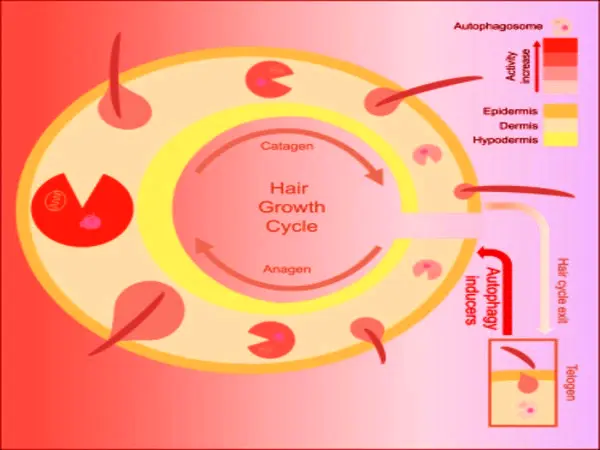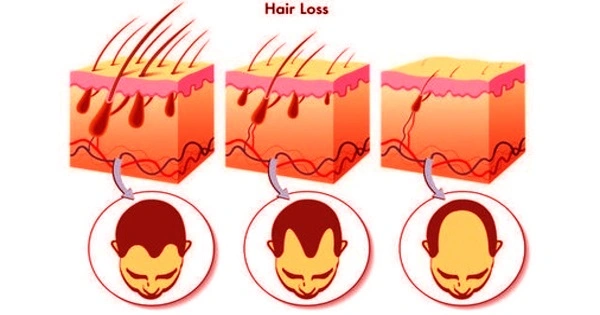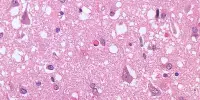Scientists studying the intricate machinery of hair growth have made an important discovery concerning the behavior of key cells in follicles. The study reveals a previously unknown role for a signaling molecule, whose messages were discovered to be critical to new growth and could be used to treat human hair loss.
Dermal papilla cells, which live in hair follicles and help determine how fast, thick, and long hair grows, are at the heart of this study. This role has put dermal papilla cells at the forefront of much of the effort to develop new hair loss treatments, and research demonstrating how they could be produced from stem cells or deployed in 3D versions, for example, has raised some promising possibilities.
SCUBE3, a signaling molecule discovered by researchers, potently stimulates hair growth and may offer a therapeutic treatment for androgenetic alopecia, a common form of hair loss in both men and women.
Researchers from the University of California, Irvine discovered that a signaling molecule called SCUBE3 stimulates hair growth and may offer a therapeutic treatment for androgenetic alopecia, a common form of hair loss in both men and women.
There is a strong need for new, effective hair loss medicines, and naturally occurring compounds that are normally used by dermal papilla cells present ideal next-generation candidates for treatment. Our findings in the human hair transplant model validate SCUBE3’s preclinical potential.
Maksim Plikus
The study, which was published online in Developmental Cell, uncovered the precise mechanism by which dermal papilla cells, which are specialized signal-making fibroblasts at the base of each hair follicle, promote new growth. Although it is well known that dermal papilla cells play an important role in hair growth control, the genetic basis of the activating molecules involved is unknown.
“At different times during the hair follicle life cycle, the very same dermal papilla cells can send signals that either keep follicles dormant or trigger new hair growth,” said Maksim Plikus, Ph.D., UCI professor of developmental & cell biology and the study’s corresponding author. “We revealed that the SCUBE3 signaling molecule, which dermal papilla cells produce naturally, is the messenger used to ‘tell’ the neighboring hair stem cells to start dividing, which heralds the onset of new hair growth.”

In both mice and humans, the production of activating molecules by dermal papilla cells is essential for efficient hair growth. Dermal papilla cells malfunction in people with androgenetic alopecia, reducing the normally abundant activating molecules. For this study, a mouse model with hyperactivated dermal papilla cells and excessive hair was created, which will allow for more discoveries about hair growth regulation.
“By studying this mouse model, we were able to identify SCUBE3 as a previously unknown signaling molecule that can drive excessive hair growth,” said co-first author Yingzi Liu, a postdoctoral researcher in developmental & cell biology at UCI.
Further research confirmed that SCUBE3 stimulates hair growth in human follicles. SCUBE3 was microinjected into mouse skin with human scalp follicles transplanted, inducing new growth in both the dormant human and surrounding mouse follicles.
“These experiments show that SCUBE3 or derived molecules can be a promising therapeutic for hair loss,” said co-first author and UCI postdoctoral researcher in mathematics Christian Guerrero-Juarez.
Currently, the Food and Drug Administration has approved two medications for androgenetic alopecia: finasteride and minoxidil. Finasteride is only approved for use in men. Both drugs are not universally effective and must be taken on a daily basis to maintain their clinical effect.
“There is a strong need for new, effective hair loss medicines, and naturally occurring compounds that are normally used by dermal papilla cells present ideal next-generation candidates for treatment,” Plikus said. “Our findings in the human hair transplant model validate SCUBE3’s preclinical potential.”
UCI has filed a provisional patent application for the use of SCUBE3 and related molecular compounds to stimulate hair growth. Plikus’ lab and Amplifica Holdings Group Inc., a biotechnology company he co-founded, will conduct additional research.
















